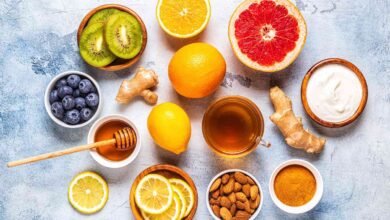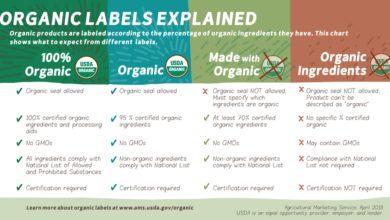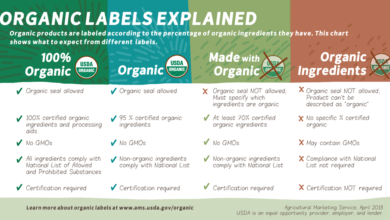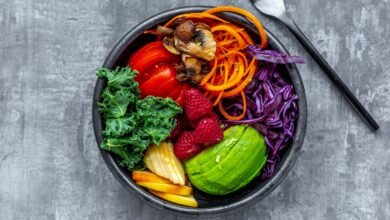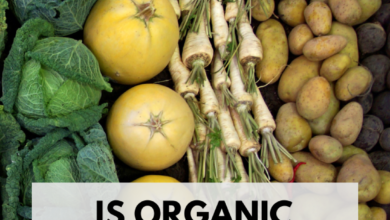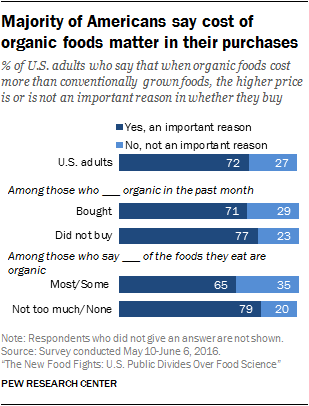
Why Do Some People Believe That Organic Food is Important for Health
Organic food is believed to be healthier by some people. They think it offers better nutrition and fewer chemicals.
But why is this belief so strong among many individuals? Organic foods have gained popularity in recent years. More people choose them over conventional options. The reasons are varied and personal. Some believe organic foods are safer due to the absence of synthetic pesticides and fertilizers.
Others think they are more nutritious and better for the environment. These beliefs stem from a growing awareness of health and wellness. As people seek ways to improve their diets, organic food becomes a preferred choice. This shift reflects a desire for natural and sustainable living. But what drives this preference? Understanding the reasons behind it can help us make informed choices about what we eat.

Credit: www.instagram.com
Organic Food Basics
Organic food attracts those seeking healthier choices. The term “organic” often implies better nutrition and fewer chemicals. People believe organic food is important for health due to its natural growth process. This section explores the basics of organic food, including its definitions and labels.
Defining Organic
Organic refers to how food is grown and processed. Farmers avoid synthetic pesticides and fertilizers. They prioritize natural methods like composting and crop rotation. Organic farming aims to protect the environment and maintain soil health. It encourages biodiversity and sustainable practices.
Common Organic Labels
Organic labels help consumers identify genuine organic products. The USDA Organic label is widely recognized in the United States. It ensures products meet strict organic standards. Other labels include “100% Organic” and “Made with Organic Ingredients.” These labels indicate the percentage of organic content in a product.
Understanding these labels is crucial. They guide consumers in making informed choices. Labels provide transparency about farming methods. They reassure buyers about the absence of synthetic additives. Knowing what each label means can influence purchasing decisions.

Credit: news.climate.columbia.edu
Health Benefits Perception
Some people believe organic food is crucial for health due to its perceived natural growth process. They often think it contains fewer chemicals and additives. This belief suggests organic food might be safer and healthier compared to conventional options.
When it comes to food choices, many people are increasingly turning to organic options. This shift is often driven by the belief that organic food offers significant health benefits. But what exactly fuels this perception? Let’s explore some of the key reasons people believe organic food might be better for their health.Nutrient Content
Some people argue that organic foods are richer in nutrients. Studies have shown that organic produce can have higher levels of certain vitamins and minerals. For example, organic tomatoes may contain more vitamin C than their conventional counterparts. Have you ever tasted an organic apple? Many people say the flavor is more intense, which could signal higher nutrient density. However, it’s important to note that nutrient content can vary based on factors like soil quality and farming practices.Reduced Chemical Exposure
One of the major draws of organic food is the reduced exposure to synthetic chemicals. Organic farming restricts the use of artificial pesticides and fertilizers. This can be reassuring if you’re concerned about the potential health risks associated with these chemicals. Imagine you’re preparing a salad for your family. Choosing organic vegetables might give you peace of mind, knowing they’re less likely to contain pesticide residues. While washing conventional produce reduces these residues, some people prefer to avoid them altogether by going organic. Do you ever think about how what you eat affects your long-term health? Reducing chemical exposure through organic foods is one way some people aim to protect their wellbeing. By considering the potential nutrient benefits and reduced chemical exposure, you can decide if organic food aligns with your health goals. What do you think? Is it worth the switch for you and your family?Environmental Impact
Organic food has gained attention for its environmental benefits. Many people believe it plays a vital role in protecting our planet. The farming methods used in organic agriculture often support a healthier earth.
Organic farming avoids synthetic chemicals. This leads to cleaner water and soil. Below are key areas where organic farming impacts the environment positively.
Sustainable Farming Practices
Organic farming uses natural resources wisely. It focuses on soil health and water conservation. Farmers use compost and natural fertilizers to enrich the soil. This reduces the need for artificial chemicals.
Crop rotation is a common practice. It helps maintain soil fertility. It also reduces pests and diseases naturally. Farmers use less energy, making the process more sustainable.
Biodiversity Preservation
Organic farms support a variety of plant and animal life. Diverse crops attract different insects and birds. This creates a balanced ecosystem. Organic farms often have more wildlife than conventional farms.
By avoiding pesticides, organic farming protects beneficial insects. These insects play a crucial role in pollination. This helps maintain the natural balance needed for healthy ecosystems.
Food Safety Concerns
Food safety concerns often motivate people to choose organic food. Many individuals worry about the long-term effects of chemicals and modifications in their diet. These concerns are quite valid and can significantly influence your health choices.
Pesticides And Herbicides
Organic food is often praised for being free of synthetic pesticides and herbicides. Unlike conventional farming, organic farming uses natural methods to control pests and weeds. This reduces your exposure to potentially harmful chemicals that can linger on non-organic produce.
Imagine eating a fresh apple without worrying about washing off a chemical residue. Isn’t it comforting to know that organic farming prioritizes your health by avoiding synthetic substances? That’s a key reason many people opt for organic options.
Genetic Modification Issues
Genetically modified organisms (GMOs) are another concern for many health-conscious individuals. Organic foods are non-GMO, meaning they haven’t been altered at a genetic level. This assurance can be a relief if you’re cautious about eating foods with unknown long-term health effects.
Think about the last time you read a food label and wondered what exactly you’re eating. Choosing organic eliminates that uncertainty, letting you eat with confidence. What do you think about the idea of consuming food that’s as close to its natural state as possible?
Food safety is a compelling reason to consider organic. By reducing your exposure to synthetic chemicals and GMOs, you might find yourself feeling more at ease with your diet. Plus, it invites you to reflect on the quality of the food you consume daily.
Consumer Trust
Consumer trust plays a pivotal role in the organic food movement. When you choose organic, you often do so because you believe in the integrity of the product. It’s not just about what’s on your plate, but also about the journey it took to get there.
Have you ever felt uncertain about the claims on food labels? With organic food, transparency offers peace of mind. Let’s explore how transparency and certification build this trust.
Transparency In Production
Organic food producers are committed to clear and honest practices. They share detailed information about how food is grown, processed, and brought to market. This transparency is like a window into their operations, offering you a glimpse into their world.
Imagine visiting a local organic farm. You see firsthand the sustainable methods used. This openness reassures you that what you’re consuming aligns with your health values.
Do you wonder about pesticide residues on conventional produce? Organic farmers openly disclose the absence of synthetic chemicals, reinforcing your trust in their products. This transparency ensures you know exactly what you’re eating.
Trust In Certification
Organic certification acts as a badge of trust for consumers. Certified organic products must meet strict standards set by recognized authorities. This certification is not just a label; it’s a promise.
When you see the organic label, you know the product has been scrutinized thoroughly. This examination covers everything from soil quality to animal welfare. You can trust that certified organic food is held to high standards.
Have you ever wondered if organic claims are real? Certification confirms these claims through rigorous testing and inspection. You can be confident that your choice is backed by solid evidence, not just marketing.
Your trust in organic food is built on a foundation of transparency and certification. These elements ensure that what you consume is safe, healthy, and aligned with your values. Isn’t it comforting to know you can trust what you eat?

Credit: www.pewresearch.org
Economic Factors
Organic food often sparks debates about its health benefits and costs. Many believe organic food holds economic importance too. Economic factors play a role in why some choose organic. They influence both consumers and producers in the market.
Cost Implications
The price of organic food is usually higher. This is due to various factors. Organic farming avoids synthetic pesticides and fertilizers. These farming practices can be more labor-intensive. Farmers must invest more time and effort. This increases the cost of production. Additionally, organic certification requires fees. These costs add to the final price of products.
Despite the higher cost, some believe it’s worth it. They value the potential health benefits. The absence of chemicals is a key factor. Paying more for organic food is often seen as an investment in health.
Market Demand
The demand for organic food has risen in recent years. People are more aware of health and environmental impacts. This shift in consumer preference has economic effects. As demand increases, more farmers switch to organic practices. This change can lead to more competition in the market.
Increased competition might lower prices over time. More availability can also make organic food accessible to a broader audience. As market demand grows, the organic food industry continues to evolve. The economic landscape shifts with these changes, influencing consumer choices.
Organic Lifestyle Choice
Choosing an organic lifestyle isn’t just about food. It’s a broader commitment. Many believe that organic choices support a healthier life. Organic foods are grown without synthetic pesticides or fertilizers. This method often appeals to those who value natural processes. But the reasons go beyond just health. They encompass a holistic approach to living and eating.
Holistic Health Approach
Embracing an organic lifestyle often means valuing overall wellness. It’s not just about avoiding chemicals. It’s about nurturing the body naturally. People see organic food as part of a larger health puzzle. They believe it reduces exposure to harmful substances. This can lead to better physical and mental health. Many feel more energized and balanced. Organic living also often includes regular exercise and mindfulness practices. These elements together support a holistic health journey.
Ethical Eating Habits
Many who choose organic foods care about ethical consumption. They want to support sustainable farming practices. Organic farming often means better treatment of animals. It also emphasizes soil health and biodiversity. This approach aligns with the values of those who prioritize ethical eating. People often feel good knowing their choices help the planet. They also appreciate supporting farmers who care about the earth. Eating organic becomes an act of responsibility and kindness.
Criticism And Counterarguments
Many argue organic food is key for better health due to fewer pesticides and additives. Critics counter that conventional food is equally nutritious and often more affordable. This debate highlights differing views on nutrition and cost.
Organic food is often hailed as the gold standard for healthy eating. However, not everyone is sold on the idea. Some people question its actual benefits for health and sustainability. Let’s dive into the criticisms and counterarguments surrounding organic food to help you make informed choices.Scientific Debate
Scientific studies on organic food often yield mixed results. Some research suggests that organic produce may contain higher levels of certain nutrients. Others show no significant difference compared to conventional options. Critics argue that the term “organic” is more of a marketing strategy than a health benefit. They highlight the lack of solid evidence proving organic foods are consistently better for your health. Yet, proponents counter with studies showing fewer pesticide residues in organic foods. They argue that even small differences can impact long-term health. Can we afford to ignore these potential benefits?Cost Vs. Benefit Analysis
Organic foods usually come with a higher price tag. Many people wonder if the health benefits justify the cost. Is spending extra worth the peace of mind about what you’re consuming? Critics claim that the financial burden of organic products limits accessibility for many. They argue that nutritious eating should be affordable for everyone, not just those who can pay more. Supporters suggest weighing the potential long-term savings on healthcare against the immediate costs of organic food. They ask you to consider the value of investing in your health now to potentially avoid future medical expenses. Does this make you rethink your grocery list? Navigating these criticisms and counterarguments can be challenging. As you weigh these perspectives, remember the importance of aligning your food choices with your personal values and lifestyle. What truly matters to you in the journey toward better health?Frequently Asked Questions
Why Do People Think Organic Food Is Healthier?
People believe organic food is healthier due to fewer pesticides and synthetic additives. It often contains higher nutrient levels. Organic farming supports sustainable practices, enhancing soil and ecosystem health. The absence of GMOs in organic food also appeals to health-conscious individuals, contributing to its perceived health benefits.
Why Is It Important To Eat Organic Foods?
Eating organic foods reduces exposure to pesticides and chemicals. They often contain higher nutrients and antioxidants. Organic farming supports environmental sustainability and soil health. Consuming organic foods can improve overall health and well-being. Choosing organic supports animal welfare and promotes biodiversity.
Why Do Some People Believe That Food In The Past Was Healthier Than Today?
Many believe past food was healthier due to fewer additives, less processing, and more organic farming practices. People also associate traditional diets with natural ingredients and seasonal produce, which might contribute to this perception. Nostalgia for simpler times may also influence this belief.
What Are The Pros And Cons Of Organic Food?
Organic food offers health benefits, fewer pesticides, and environmental sustainability. It can be more expensive and have limited availability. Organic farming supports biodiversity but may yield less produce. Nutritional differences between organic and conventional foods are often minimal. Choose organic for a cleaner, eco-friendly option.
Conclusion
Organic food holds a special place in many people’s diets. People believe it offers health benefits. Fewer chemicals. More nutrients. These factors may improve wellness. Some feel organic choices support better farming practices. The environment benefits too. It’s about quality.
A lifestyle choice. Not everyone agrees, but the trend grows. People seek healthier options. Organic food becomes more popular. Personal preference matters most. The decision depends on individual values. Health, taste, and impact. Explore organic choices. Discover what suits your lifestyle.
Feel the difference. Make informed choices. Your health journey is unique.


